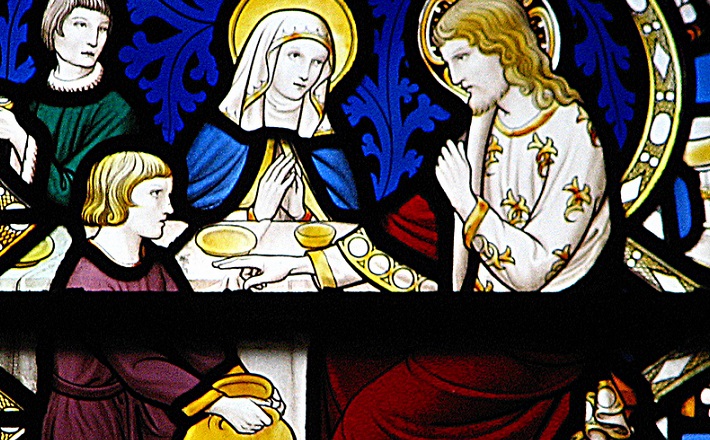Commentary on John 2:1-11
Even though Jesus arrived at a wedding with a funereal face, he immediately caught the festive mood!
Jesus — following the steps of his cousin John the Baptizer, who de-centralized the temple to the Jordan River — in this story does the same with the wedding at Cana of Galilee. For Jesus, like for Moses and the burning bush (Exodus 3), the whole land is holy. There’s no distinction between sacred spaces and secular sites, since God’s presence permeated everything.
God chose a small village in a tiny, insignificant country for the Son’s incarnation. This is precisely where Jesus begins his pastoral work, in order to communicate this message clearly: big is not a synonym of great, small is not interchangeable with insignificant. The Nazarene put Cana on the map! As a result, empires do not have the last word.
Do whatever he tells you
In divinizing Mary some churches miss the point. In invisibilizing Jesus’ mother other churches lose their way. Martin Luther’s Commentary on the Magnificat does justice to this great woman by articulating a liberating Mariology. For instance, Luther reminds us that “a humble servant” (Luke 1:48) is not Mary’s moral attribute. It is her economic and social condition.
Latino culture clicks with this story and Mary’s indirectness, as evidenced in the Spanish phrase a la buena entendedora pocas palabras, (“a good understander only needs a few words”). This is a cultural element of not being so direct, so explicit, so didactic. We Latinos and Latinas feel at home with beating around the bushes — it is a cultural inheritance from our indigenous ancestors, our black roots, our Arab heritage, and our Jewish spiritual legacy. Mary knows that Jesus won’t abandon her, just as she won’t abandon him on the cross (Luke 19:25-27).
Her words “do whatever he tells you” point to Mary’s “discipline,” the same word for “discipleship,” a trait that is displayed throughout her entire life. In spite of the fact that her son is somewhat rude in his response; in spite of being an unwed mother, who could’ve been punished with a death sentence (John 8:41); in spite of the fact that Mary was not allowed to choose the name of her first fruit of her womb (Matthew 1:21); in spite of the fact that Mary had to run away from persecution to her cousin’s home (Luke 1:39-45) — still Mary invites us: “do whatever he tells you.”
Jesus, provider of the most exquisite wine
In Jesus’ time weddings were known as drinking parties. Wine was the celebration drink (Judges 19:4): “No wine, no happiness.” Jesus accepted the invitation of a poor couple from a gray village to remind us that he came to provide a life of plenty for everybody (John 10:10), not just for the jet set. That couple would’ve started their marriage journey badly, they would’ve been the talk of the town by not providing enough wine, but Jesus literally saved them.
Let me hasten to add that Jesus’ public image as a “drunkard and glutton” doesn’t correspond with the disciplined life he had (Luke 9:58). That stereotype is the product of lies from the official media. Any likeness with current vilification of the Latina/Latino community — as fiesta people and mañana folks — is not coincidental. In fact, the opposite is the truth. The agricultural laborers and César Chávez hold the record of the longest USA strike. Those Chicanos denounced the “bloody grapes” that ended up on many tables at the expense of the broken backs of Latinos and their families.
And even more, from the perspective of Latino families, mañana doesn’t translate into procrastination, laziness, “don’t leave for tomorrow what you can do the day after tomorrow.” Not at all. Mañana points to the greatest Christian utopia: the banquet. Endure, resist, and don’t give up the fight today: tomorrow will be different.
In those days food and wine were not served indiscriminately to the guests sitting at the same table. It was based on their social status. Some guests got the cheapest wine — a mixture of wine, vinegar, and water — like the one Jesus was offered on the cross (Luke 23:36), while others drank grand reserve. The good news is that Jesus’ wine is for everybody.
To be sure, Jesus neither promotes Rome’s saturnalia nor Greece’s bacchanalia. Jesus takes the side of the poor groom and bride who ran out of wine in the middle of the fiesta. The Nazarene clinks glasses of wine with folks who are exhausted by poverty, telling them salud, cheers, skol, meaning salvation, liberation, humanization, healing.
To the folks whose lands have been plundered by the big vineyard owners, Jesus provided the most exquisite wine. By providing 120 gallons (approximately 450 liters) of the vineyard’s fruit at a premium of $300 dollars per liter, Jesus picked up the bill of $135,000! Little wonder John Calvin demanded one barrel of wine a year for the clergy. The Reformer agrees that wine can be medicinal but, above all, wine is to get merry!1
A happy theophany
The liberating news in this gospel is that the Reign of God has gotten rid of all hierarchies. “Epiphany” is the manifestation of “one of us,” a Nazarene who attends weddings, who celebrates life in togetherness. Jesus is showing us God’s glory, God’s sense of humor, God’s nearness, mingling. God is not an absentee landlord, the metaphysical god of the philosophers, the never-present father. No, Jesus will never say we are “too close for comfort.”
Notes:
1 Commenting Psalm 104:15 in Joannis Calvini Opera, 32:91.


January 17, 2016